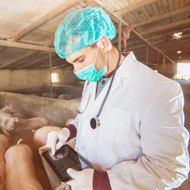Survey highlights ‘key wellbeing issues’ in government vets

Only 25 per cent said their workload was acceptable, while three quarters said it was either high or unacceptable.
The majority of government vets say they work in emotionally and physically challenging environments, yet a third are unaware of workplace policies to help them deal with this.
This is according to a recent survey by the Association of Government Veterinarians (AGV). Over 700 vets responded to the survey, which looked at key issues affecting wellbeing.
Key findings include:
- over half (57 per cent) of respondents said they work in ethically challenging situations. Witnessing and monitoring non-stun slaughter was commonly cited as a current example that causes distress
- only 25 per cent said their workload was acceptable, while three quarters said it was either high or unacceptable
- fifty-four per cent said they witnessed distressing situations
- the majority (94 per cent) had to engage in difficult conversations, but just a quarter said they had had training to deal with this
- about a third of respondents were involved in mass culling or euthanasia events, and almost two thirds found this emotionally challenging. However, only 17 per cent knew of support mechanisms in place
- most worked in an organisation with a ‘walk away’ policy when faced with threats, but over a quarter were unaware of this
- there were varying degrees of concern about lone working. A fifth felt their organisations could provide support in this, and offered a range of possible solutions.
On a positive note, a high percentage of participants felt that they had clear work objectives, could manage their work effectively, had control over their own work and could manage distressing situations. Most felt they had been given adequate training, but some areas were highlighted for improvement.
Support from colleagues and being part of a team appeared to offer invaluable support mechanisms to colleagues during difficult periods.
Commenting on the findings, the UK’s chief veterinary officer Christine Middlemiss said: “I welcome this report and thank the Association of Government Vets for their initiative in grasping the well-being ‘nettle’, a subject that can be difficult and awkward but must not be ignored. Tackling well-being must not end up in the ‘too difficult’ box.
“The first steps in the journey of resolving a problem is to first recognise it and secondly understand it beyond the superficial and anecdotal. In my opinion this is what AGV have done with this report.”
Following the results of the survey, AGV has released a set of 32 recommendations. These include raising awareness of and establishing policies for dealing with violent or aggressive behaviour, lone working and ‘walk away’ policies.
Employers could also offer more practical training in areas where vets feel this is lacking, and provide more emotional, physical and psychological support for those working on major, high profile events. AGV said it is imperative that vets feel supported and receive adequate training. The group also recommended a review of government vet salaries and fees.
Read the full report here: https://www.agv.org.uk/



 The RCVS has announced a new version of its 1CPD mobile app, with enhanced features for veterinary surgeons and veterinary nurses to record their continuing professional development.
The RCVS has announced a new version of its 1CPD mobile app, with enhanced features for veterinary surgeons and veterinary nurses to record their continuing professional development.